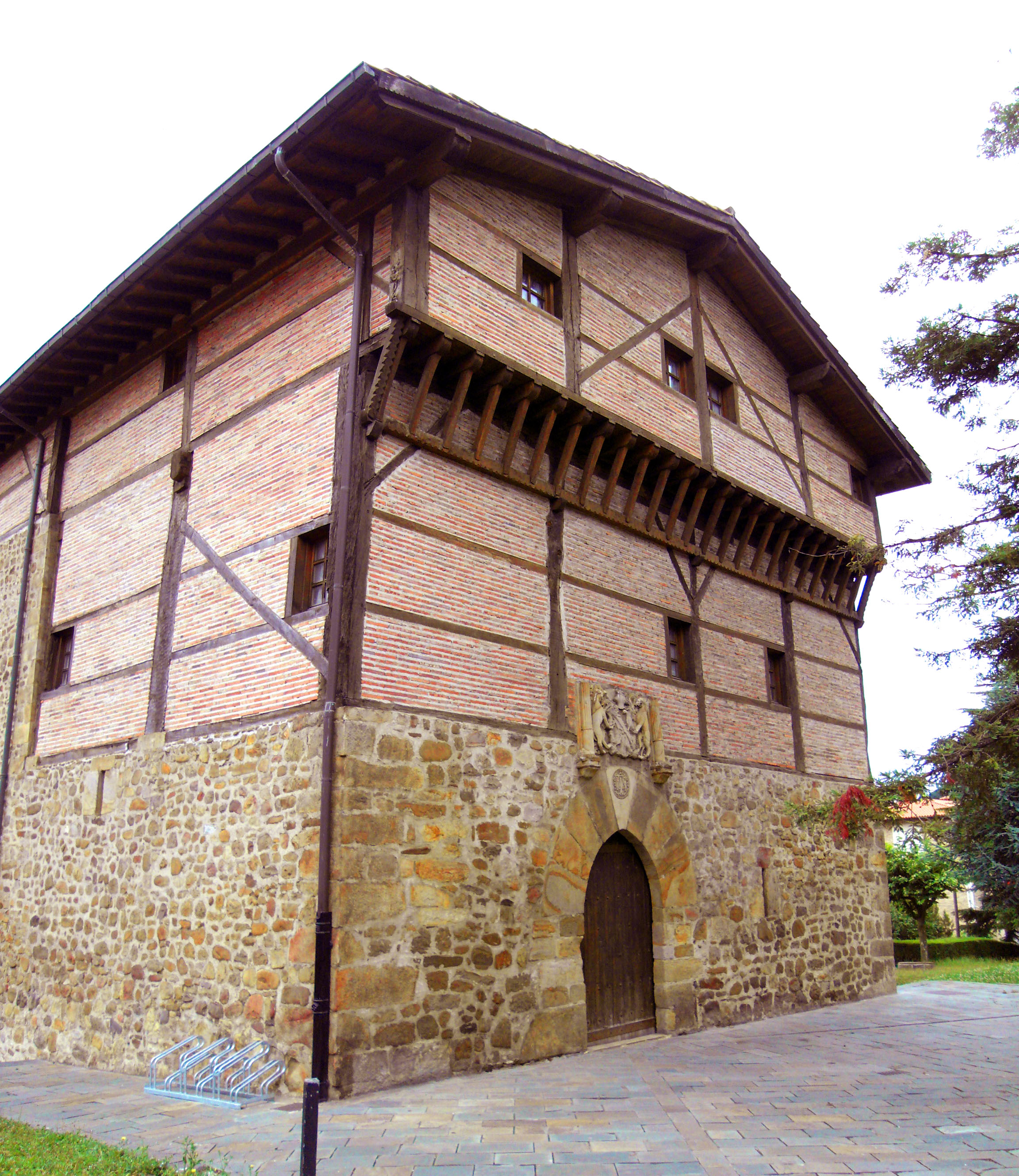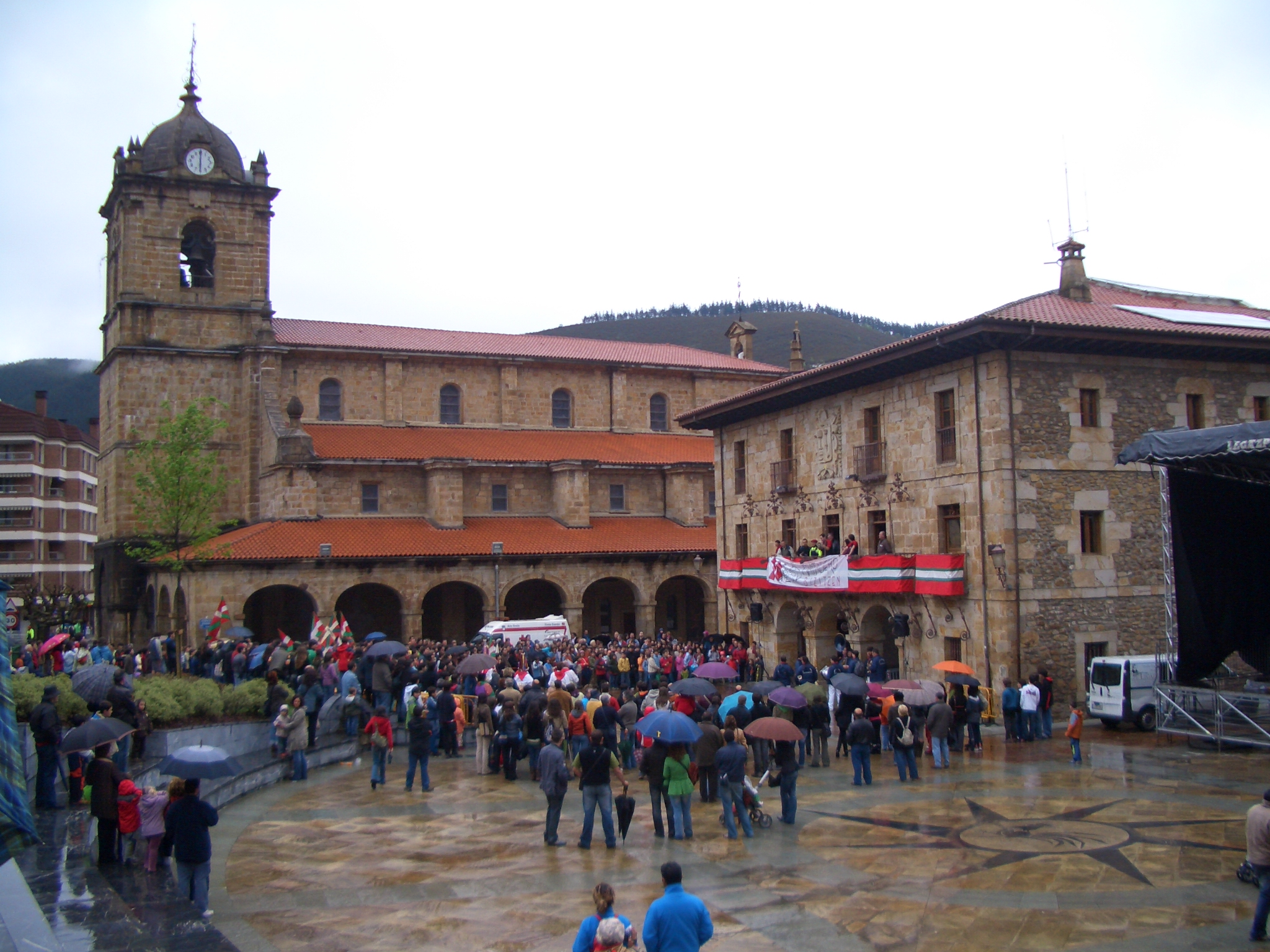|
Zumarraga, Gipuzkoa
Zumarraga () is a municipality and industrial town in Gipuzkoa province of the Basque Country autonomous community of northern Spain, approximately by road southwest of San Sebastián and northwest of Idiazabal. As of 2018 the municipality had a population of 9834 people. The Urola river flows through the vicinity. It is the birthplace of Miguel López de Legazpi, conquistador who explored the Pacific Islands and the East Indies, and of Iñaki Urdangarín, the husband of Infanta Cristina of Spain. History In 1446 a battle took place there during the War of the Bands. In the 15th-century, the bridge that separates the municipalities of Zumárraga and Urretxu was named after the Zufiaur family. Geography Zumárraga is situated in the Gipuzkoan valley of Alto Urola. The valley is narrow with a width of about . On the west, the Urola River separates it from the neighboring Urrechu, with which it forms an urban area. In the south, it borders with Legazpi and Gaviria, in the west ... [...More Info...] [...Related Items...] OR: [Wikipedia] [Google] [Baidu] |
Municipalities Of Spain
The municipality ( es, municipio, , ca, municipi, gl, concello, eu, udalerria, ast, conceyu)In other languages of Spain: * Catalan/Valencian (), sing. ''municipi''. * Galician () or (), sing. ''municipio''/''bisbarra''. *Basque (), sing. ''udalerria''. * Asturian (), sing. ''conceyu''. is the basic local administrative division in Spain together with the province. Organisation Each municipality forms part of a province which in turn forms part or the whole of an autonomous community (17 in total plus Ceuta and Melilla): some autonomous communities also group municipalities into entities known as ''comarcas'' (districts) or ''mancomunidades'' (commonwealths). There are a total of 8,131 municipalities in Spain, including the autonomous cities of Ceuta and Melilla. In the Principality of Asturias, municipalities are officially named ''concejos'' (councils). The average population of a municipality is about 5,300, but this figure masks a huge range: the most populo ... [...More Info...] [...Related Items...] OR: [Wikipedia] [Google] [Baidu] |
Iñaki Urdangarín, Duke Of Palma De Mallorca
Iñaki is a male given name. It is a neologism created by Sabino Arana meaning ''Ignatius'', to be a Basque language analog to "Ignacio" in Spanish, "Ignace" in French, and "Ignazio" in Italian, and an alternative to the names Eneko and Iñigo. Notable people * Iñaki Anasagasti - Spanish politician * Iñaki Astiz Ventura - Spanish footballer * Iñaki Azkuna - Spanish politician and former mayor of Bilbao * Iñaki Bea Jauregi - Spanish footballer * Iñaki Bonillas - Mexican artist * Iñaki de Juana Chaos - Spanish separatist * Iñaki Descarga - Spanish footballer * Iñaki Egaña - Spanish musician * Iñaki Gabilondo - Spanish journalist * Iñaki Gastón - Spanish cyclist * Iñaki Goitia Peña - Spanish footballer * Iñaki Isasi - Spanish cyclist * Iñaki Lafuente - Spanish footballer * Iñaki Mallona Txertudi - Puerto Rican Roman Catholic bishop * Iñaki Muñoz - Spanish footballer * Iñaki Ochoa de Olza - Spanish mountain climber *Iñaki Peña, Footballer * Iñaki Plaza Murga ... [...More Info...] [...Related Items...] OR: [Wikipedia] [Google] [Baidu] |
Vicente Larrea
Vicente is an Italian, Spanish, and Portuguese name. Like its French variant, Vincent, it is derived from the Latin name ''Vincentius'' meaning "conquering" (from Latin ''vincere'', "to conquer"). Vicente may refer to: Location *São Vicente, Cape Verde - an island in Cape Verde People Given Name * Vicente Aleixandre (1898–1984), Spanish writer, Nobel Prize laureate * Vicente Álvarez Travieso, first alguacil mayor (1731–1779) of San Antonio, Texas * Vicente Aranda (1926–2015), Spanish film director, screenwriter and producer * Vicente del Bosque (b. 1950), former Spanish footballer and former manager of the Spain national football team * José Vicente Feliz, American settler * Vicente Fernández (1940–2021), Mexican retired singer, actor, and film producer * Vicente Fox Quesada (b. 1942), Mexican politician who served as President of Mexico * Juan Vicente Gómez (1857–1935), Venezuelan military dictator * Vicente Guaita (b. 1987), Spanish footballer * Vicente Guerrero ... [...More Info...] [...Related Items...] OR: [Wikipedia] [Google] [Baidu] |
José Antonio Pizarro
José is a predominantly Spanish and Portuguese form of the given name Joseph. While spelled alike, this name is pronounced differently in each language: Spanish ; Portuguese (or ). In French, the name ''José'', pronounced , is an old vernacular form of Joseph, which is also in current usage as a given name. José is also commonly used as part of masculine name composites, such as José Manuel, José Maria or Antonio José, and also in female name composites like Maria José or Marie-José. The feminine written form is ''Josée'' as in French. In Netherlandic Dutch, however, ''José'' is a feminine given name and is pronounced ; it may occur as part of name composites like Marie-José or as a feminine first name in its own right; it can also be short for the name ''Josina'' and even a Dutch hypocorism of the name ''Johanna''. In England, Jose is originally a Romano-Celtic surname, and people with this family name can usually be found in, or traced to, the English county of C ... [...More Info...] [...Related Items...] OR: [Wikipedia] [Google] [Baidu] |
Spanish Civil War
The Spanish Civil War ( es, Guerra Civil Española)) or The Revolution ( es, La Revolución, link=no) among Nationalists, the Fourth Carlist War ( es, Cuarta Guerra Carlista, link=no) among Carlists, and The Rebellion ( es, La Rebelión, link=no) or The Uprising ( es, La Sublevación, link=no) among Republicans. was a civil war in Spain fought from 1936 to 1939 between the Republicans and the Nationalists. Republicans were loyal to the left-leaning Popular Front government of the Second Spanish Republic, and consisted of various socialist, communist, separatist, anarchist, and republican parties, some of which had opposed the government in the pre-war period. The opposing Nationalists were an alliance of Falangists, monarchists, conservatives, and traditionalists led by a military junta among whom General Francisco Franco quickly achieved a preponderant role. Due to the international political climate at the time, the war had many facets and was variously viewed as cla ... [...More Info...] [...Related Items...] OR: [Wikipedia] [Google] [Baidu] |
Azkoitia
, population_note = , population_density_km2 = auto , blank_name_sec1 = Official language(s) , blank_info_sec1 = , timezone = CET , utc_offset = +1 , timezone_DST = CEST , utc_offset_DST = +2 , postal_code_type = Postal code , postal_code = 20720 , area_code_type = Dialing code , area_code = , leader_title = Mayor , leader_name = Javier Zubizarreta , leader_party = Basque Nationalist Party , website = , footnotes = Azkoitia ( es, Azcoitia) is a town located in the province of Gipuzkoa, in the Autonomous Community of Basque Country, in northern Spain. It is also the seat of the municipality of the same name. Geographical setting Azkoitia and the municipality of the same name, are located on and around the upper Urola river valley, centered on a small alluvial plain surrounded by the Ba ... [...More Info...] [...Related Items...] OR: [Wikipedia] [Google] [Baidu] |
Azpeitia
, population_note = , population_density_km2 = auto , blank_name_sec1 = Official language(s) , blank_info_sec1 = , timezone = CET , utc_offset = +1 , timezone_DST = CEST , utc_offset_DST = +2 , postal_code_type = Postal code , postal_code = 20730 , area_code_type = Dialing code , area_code = , leader_title = Mayor , leader_name = Nagore Alkorta , leader_party = Bildu , website = , footnotes = Azpeitia (meaning 'down the rock' in Basque) is a town and municipality within the province of Gipuzkoa, in the Basque Country, Spain, located on the Urola river a few kilometres east of Azkoitia. Its population is 14,580 (as of 2014). It is located 41 kilometres southwest of Donostia/San Sebastián. Azpeitia is the birthplace of Ignatius of Loyola. The house of his birth is now preserved as a ... [...More Info...] [...Related Items...] OR: [Wikipedia] [Google] [Baidu] |
Ezkio-Itsaso
Ezkio-Itsaso (formerly in Spanish, ''Ezquioga-Ichaso'') is a municipality in the province of Gipuzkoa, in the autonomous community of Basque Country, in northern Spain. It was founded in 1965 by the fusion of the municipalities of Ezkio and Itsaso. In December 2016 the Regional Council of Gipuzkoa tried to split Ezkio-Itsaso into two independent municipalities. However, this was refused by Spanish central government and finally dismissed by court decisions (judgments of 09/07/2018 and 09/20/2019 of the TSJ Madrid). Ezkio was renowned in the 1930s for the apparitions of the Virgin Mary even though the Catholic Church has not authenticated them. There is an advanced project to build an AVE high-speed train station in Ezkio-Itsaso that would become an important travel hub connecting the Basque Y to Navarre. See also * Ezkio * Itsaso External links Official WebsiteInformation available in Spanish and Basque Basque may refer to: * Basques, an ethnic group of Spain and France ... [...More Info...] [...Related Items...] OR: [Wikipedia] [Google] [Baidu] |
Gaviria
Gaviria is a surname. Notable people with the surname include: * Alejandro Gaviria Uribe (born 1966), Colombian economist and politician *Alfonso Araújo Gaviria (1902–1961), Colombian lawyer and diplomat * Aníbal Gaviria Correa (born 1966), Colombian politician *Carlos Gaviria Díaz (1937–2015), Colombian lawyer and politician * César Gaviria Trujillo (born 1947), Former President of Colombia * Iván Duque Gaviria (1955–2019), Colombian prisoner and former paramilitary leader * Fernando Gaviria Rendon, (born 1994), Colombian professional road and track racing cyclist *Guillermo Gaviria Correa (1962–2003), Colombian politician * Hermán Gaviria Carvajal (1969–2002), Colombian footballer * Inés Gaviria (born 1979), Colombian singer-songwriter * Juliana Gaviria Rendon (born 1991), Colombian Olympic cyclist * Julio Edgar Gaviria Arenas (1945–2009), Colombian footballer * Margarita Vargas Gaviria (born 1971), Colombian singer *Pablo Escobar Gaviria Pablo Emilio Esc ... [...More Info...] [...Related Items...] OR: [Wikipedia] [Google] [Baidu] |
Legazpi, Gipuzkoa
Legazpi is a city in the Gipuzkoa province of the Autonomous Community of the Basque Country, northern Spain. Legazpi is a town of about 9,000 inhabitants located on top of the Urola valley, in Gipuzkoa. Surrounded by mountains, and at the foot of the Aizkorri mountain range, its predominant economic activity is industrial (manufacturing, metal processing, plastics). The rich industrial tradition of Legazpi goes back to the High Middle Ages, when transformation of iron ore was achieved by means of the ''haizeolak'' ("ironworks moved by wind"). During the 14th century, wind energy came to be replaced by water in the metal processing with the foundation of several "ironworks propelled by water" (''ur'' 'water' and ''ola'' originally 'shack', are the two lexical components of "Urola The Urola is a river and valley in Gipuzkoa, Basque Autonomous Community, Spain. The river is only 55 kilometres in length, and runs from headwaters in the Aizkorri Mountains, near the town of Le ... [...More Info...] [...Related Items...] OR: [Wikipedia] [Google] [Baidu] |
Alto Urola
The musical term alto, meaning "high" in Italian (Latin: ''altus''), historically refers to the contrapuntal part higher than the tenor and its associated vocal range. In 4-part voice leading alto is the second-highest part, sung in choruses by either low women's or high men's voices. In vocal classification these are usually called contralto and male alto or countertenor. Such confusion of "high" and "low" persists in instrumental terminology. Alto flute and alto trombone are respectively lower and higher than the standard instruments of the family (the standard instrument of the trombone family being the tenor trombone), though both play in ranges within the alto clef. Alto recorder, however, is an octave higher, and is defined by its relationship to tenor and soprano recorders; alto clarinet is a fifth lower than B-flat clarinet, already an 'alto' instrument. There is even a contra-alto clarinet, (an octave lower than the alto clarinet), with a range B♭0 – D4. Etymology ... [...More Info...] [...Related Items...] OR: [Wikipedia] [Google] [Baidu] |



